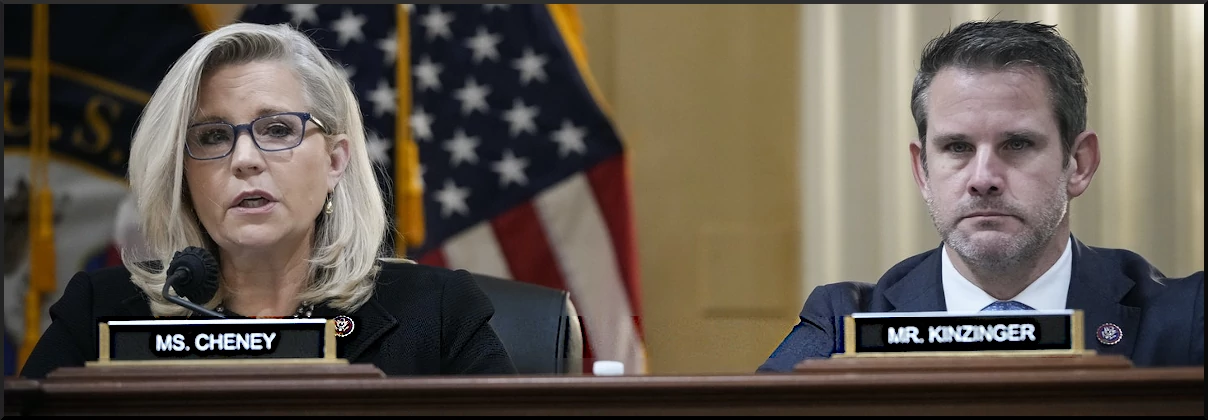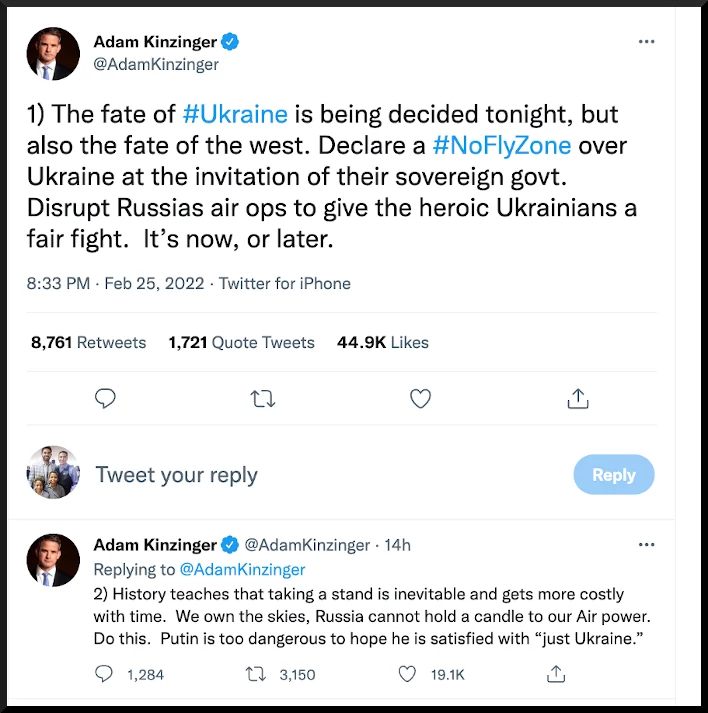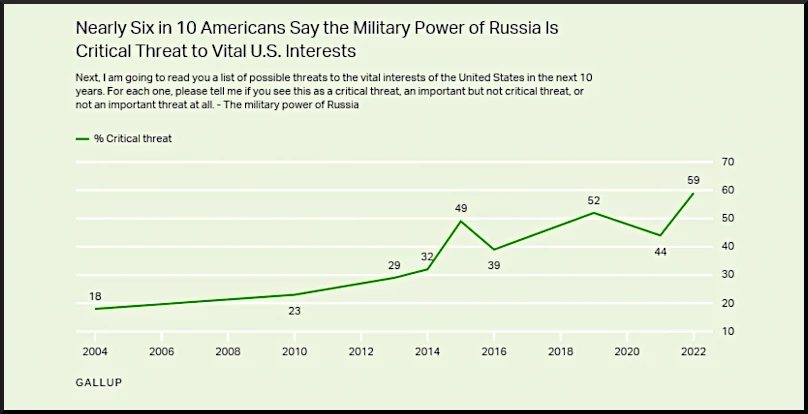by Glenn Greenwald, published on Glen’s Substack, February 27, 2022
In the weeks leading up to the Russian invasion of Ukraine, those warning of the possible dangers of U.S. involvement were assured that such concerns were baseless. The prevailing line insisted that nobody in Washington is even considering let alone advocating that the U.S. become militarily involved in a conflict with Russia. That the concern was based not on the belief that the U.S. would actively seek such a war, but rather on the oft-unintended consequences of being swamped with war propaganda and the high levels of tribalism, jingoism and emotionalism that accompany it, was ignored. It did not matter how many wars one could point to in history that began unintentionally, with unchecked, dangerous tensions spiraling out of control. Anyone warning of this obviously dangerous possibility was met with the “straw man” cliché: you are arguing against a position that literally nobody in D.C. is defending.
Less than a week into this war, that can no longer be said. One of the media’s most beloved members of Congress, Rep. Adam Kinzinger (R-IL), on Friday explicitly and emphatically urged that the U.S. military be deployed to Ukraine to establish a “no-fly zone” — i.e., American soldiers would order Russia not to enter Ukrainian airspace and would directly attack any Russian jets or other military units which disobeyed. That would, by definition and design, immediately ensure that the two countries with by far the planet’s largest nuclear stockpiles would be fighting one another, all over Ukraine.
Kinzinger’s fantasy that Russia would instantly obey U.S. orders due to rational calculations is directly at odds with all the prevailing narratives about Putin having now become an irrational madman who has taken leave of his senses — not just metaphorically but medically — and is prepared to risk everything for conquest and legacy. This was not the first time such a deranged proposal has been raised; days before Kinzinger unveiled his plan, a reporter asked Pentagon spokesman John Kirby why Biden has thus far refused this confrontational posture. The Brookings Institution’s Ben Wittes on Sunday demanded: “Regime change: Russia.” The President of the Council on Foreign Relations, Richard Haass, celebrated that “now the conversation has shifted to include the possibility of desired regime change in Russia.”
Having the U.S. risk global nuclear annihilation over Ukraine is an indescribably insane view, as one realizes upon a few seconds of sober reflection. We had a reminder of that Sunday morning when “Putin ordered his nuclear forces on high alert Sunday, reminding the world he has the power to use weapons of mass destruction, after complaining about the West’s response to his invasion of Ukraine” — but it is completely unsurprising that it is already being suggested.
There is a reason I devoted the first fifteen minutes of my live video broadcast on Thursday about Ukraine not to the history that led us here and the substance of the conflict (I discussed that in the second half), but instead to the climate that arises whenever a new war erupts, instantly creating propaganda-driven, dissent-free consensus. There is no propaganda as potent or powerful as war propaganda. It seems that one must have lived through it at least once, as an engaged adult, to understand how it functions, how it manipulates and distorts, and how one can resist being consumed by it.
As I examined in the first part of that video discussion, war propaganda stimulates the most powerful aspects of our psyche, our subconscious, our instinctive drives. It causes us, by design, to abandon reason. It provokes a surge in tribalism, jingoism, moral righteousness and emotionalism: all powerful drives embedded through millennia of evolution. The more unity that emerges in support of an overarching moral narrative, the more difficult it becomes for anyone to critically evaluate it. The more closed the propaganda system is — either because any dissent from it is excluded by brute censorship or so effectively demonized through accusations of treason and disloyalty — the more difficult it is for anyone, all of us, even to recognize one is in the middle of it.
When critical faculties are deliberately turned off based on a belief that absolute moral certainty has been attained, the parts of our brain armed with the capacity of reason are disabled. That is why the leading anti-Russia hawks such as former Obama Ambassador Michael McFaul and others are demanding that no “Putin propagandists” (meaning anyone who diverges from his views of the conflict) even be permitted a platform, and why many are angry that Facebook has not gone far enough by banning many Russian media outlets from advertising or being monetized. Sen. Mark Warner (D-VA), using the now-standard tactic of government officials dictating to social media companies which content they should and should not allow, announced on Saturday: “I’m concerned about Russian disinformation spreading online, so today I wrote to the CEOs of major tech companies to ask them to restrict the spread of Russian propaganda.” Suppressing any divergent views or at least conditioning the population to ignore them as treasonous is how propagandistic systems remain strong.
It is genuinely hard to overstate how overwhelming the unity and consensus in U.S. political and media circles is. It is as close to a unanimous and dissent-free discourse as anything in memory, certainly since the days following 9/11. Marco Rubio sounds exactly like Bernie Sanders, and Lindsay Graham has no even minimal divergence from Nancy Pelosi. Every word broadcast on CNN or printed in The New York Times about the conflict perfectly aligns with the CIA and Pentagon’s messaging. And U.S. public opinion has consequently undergone a radical and rapid change; while recent polling had shown large majorities of Americans opposed to any major U.S. role in Ukraine, a new Gallup poll released on Friday found that “52% of Americans see the conflict between Russia and Ukraine as a critical threat to U.S. vital interests” with almost no partisan division (56% of Republicans and 61% of Democrats), while “85% of Americans now view [Russia] unfavorably while 15% have a positive opinion of it.”
The purpose of these points, and indeed of this article, is not to persuade anyone that they have formed moral, geopolitical and strategic views about Russia and Ukraine that are inaccurate. It is, instead, to highlight what a radically closed and homogenized information system most Americans are consuming. No matter how convinced one is of the righteousness of one’s views on any topic, there should still be a wariness about how easily that righteousness can be exploited to ensure that no dissent is considered or even heard, an awareness of how often such overwhelming societal consensus is manipulated to lead one to believe untrue claims and embrace horribly misguided responses.
To believe that this is a conflict of pure Good versus pure Evil, that Putin bears all blame for the conflict and the U.S., the West, and Ukraine bear none, and that the only way to understand this conflict is through the prism of war criminality and aggression only takes one so far. Such beliefs have limited utility in deciding optimal U.S. behavior and sorting truth from fiction even if they are entirely correct — just as the belief that 9/11 was a moral atrocity and Saddam (or Gaddafi or Assad) was a barbaric tyrant only took one so far. Even with those moral convictions firmly in place, there are still a wide range of vital geopolitical and factual questions that must be considered and freely debated, including:
- The severe dangers of unintended escalation with greater U.S. involvement and confrontation toward Russia;
- The mammoth instability and risks that would be created by collapsing the Russian economy and/or forcing Putin from power, leaving the world’s largest or second-largest nuclear stockpile to a very uncertain fate;
- The ongoing validity of Obama’s long-standing view of Ukraine (echoed by Trump), which persisted even after Moscow annexed Crimea in 2014 following a referendum, that Ukraine is of vital interest only to Russia and not the U.S., and the U.S. should never risk war with Russia over it;
- The bizarre way in which it has become completely taboo and laughable to suggest that NATO expansion to the Russian border and threats to offer Ukraine membership is deeply and genuinely threatening not just to Putin but all Russians, even though that warning has emanated for years from top U.S. officials such as Biden’s current CIA Director William Burns as well as scholars across the political spectrum, including the right-wing realist John Mearsheimer to the leftist Noam Chomsky.
- The clearly valid questions regarding the actual U.S intentions concerning Ukraine: i.e., that a noble, selfless and benevolent American desire to protect a fledgling democracy against a despotic aggressor may not be the predominant goal. Perhaps it is instead to revitalize support for American imperialism and intervention, as well as faith in and gratitude for the U.S. security and military state (the Eurasia Group’s Ian Bremmer suggested this week that this is the principal outcome in the West of the current conflict). Or the goal is the elevation of Russia as a vital and grave threat to the U.S. (the above polling data suggests this is already happening) that will feed weapons purchases and defense and intelligence budgets for years to come. Or one might see a desire to harm Russia as vengeance for the perception that Putin helped defeat Hillary Clinton and elected Donald Trump (that the U.S. is using Ukraine to “fight Russia over there” was explicitly stated by Rep. Adam Schiff (D-CA).Or perhaps the goal is not to “save and protect” Ukraine at all, but to sacrifice it by turning it into a new Afghanistan, where the U.S. arms a Ukrainian insurgency to ensure that Russia remains stuck in Ukraine fighting and destroying it for years (this scenario was very compellingly laid out in one of the best analyses of the Russia/Ukraine conflict, by Niccolo Soldo, which I cannot recommend highly enough).Jeff Rogg, historian of U.S. intelligence and an assistant professor in the Department of Intelligence and Security Studies at the Citadel, wrote in The LA Times that the CIA has already been training, funding and arming a Ukrainian insurgency, speculating that the model may be the CIA’s backing of the Mujahideen insurgency in Afghanistan that morphed into Al Qaeda, with the goal being “to weaken Russia over the course of a long insurgency that will undoubtedly cost as many Ukrainian lives as Russian lives, if not more.”
Again, no matter how certain one is about their moral conclusions about this war, these are urgent questions that are not resolved or even necessarily informed by the moral and emotional investment in a particular narrative. Yet when one is trapped inside a system of a complete consensus upheld by a ceaseless wave of reinforcing propaganda, and when any questioning or dissent at all is tantamount to treason or “siding with the enemy,” there is no space for such discussions to occur, especially within our minds. When one is coerced — through emotional tactics and societal inventive — to adhere only to one script, nothing that is outside of that script can be entertained. And that is all by design.
Besides 9/11 and the lead-up to the invasion of Iraq, Americans have been subjected to numerous spates of war propaganda, including in 2011 when then-President Obama finally agreed to order the U.S. to participate in a France/UK-led NATO regime change operation in Libya, as well as throughout the Obama and early Trump years when the CIA was fighting a clandestine and ultimately failed regime change war in Syria, on the same side as Al-Qaeda, to overthrow Bashar al-Assad. In both instances, government/media disinformation and emotional manipulation were pervasive, as it is in every war. But those episodes were not even in the same universe of intensity and ubiquity as what is happening now and what happened after 9/11 — and that matters a great deal for understanding why so many are vulnerable to the machinations of war propaganda without even realizing they are affected by it.
One realization I had for the first time during Russiagate was that history may endlessly repeat itself, but those who have not lived through any such history or paid attention to it previously will not know about it and thus remain most susceptible to revisionism or other tactics of deceit. When Russiagate was first elevated as a major 2016 campaign issue — through a Clinton campaign commercial filled with dark and sinister music and innuendo masquerading as “questions” about the relationship between Trump and the Kremlin — I had assumed when writing about it for the first time that most Americans, especially those on the left taught to believe that McCarthyism was one of the darkest moments for civil liberties, would instantly understand how aggressively the CIA and FBI disseminate disinformation, how servile corporate media outlets are to those security state agencies, how neocons are always found at the center of such manipulative tactics, and how potent this sort of propaganda is: creating a foreign villain said to be of unparalleled evil or at least evil not seen since Hitler, and then claiming that one’s political adversaries are enthralled or captive to them. We have witnessed countless identical cycles throughout U.S history.
But I also quickly realized that millions of Americans — either due to age or previous political indifference — began paying attention to politics for the first time in 2016 due to fear of Trump, and thus knew little to nothing about anything that preceded it. Such people had no defenses against the propaganda narrative and deceitful tactics because, for them, it was all new. They had never experienced it before and thus had no concept of who they were applauding and how such official government/media disinformation campaigns are constructed. Each generation is thus easily programmed and exploited by the same propaganda systems, no matter how discredited they were previously.
*** Glenn has a second part of this article published on his Substack where he presents and analyzes numerous instances of what he says here, but this is the critical message, which if you don’t need to hear it yourself, at least provides a perspective for talking to friends and relatives.
Glenn Greenwald is a journalist, constitutional lawyer, and author of four New York Times bestselling books on politics and law. He publishes on Substack.



